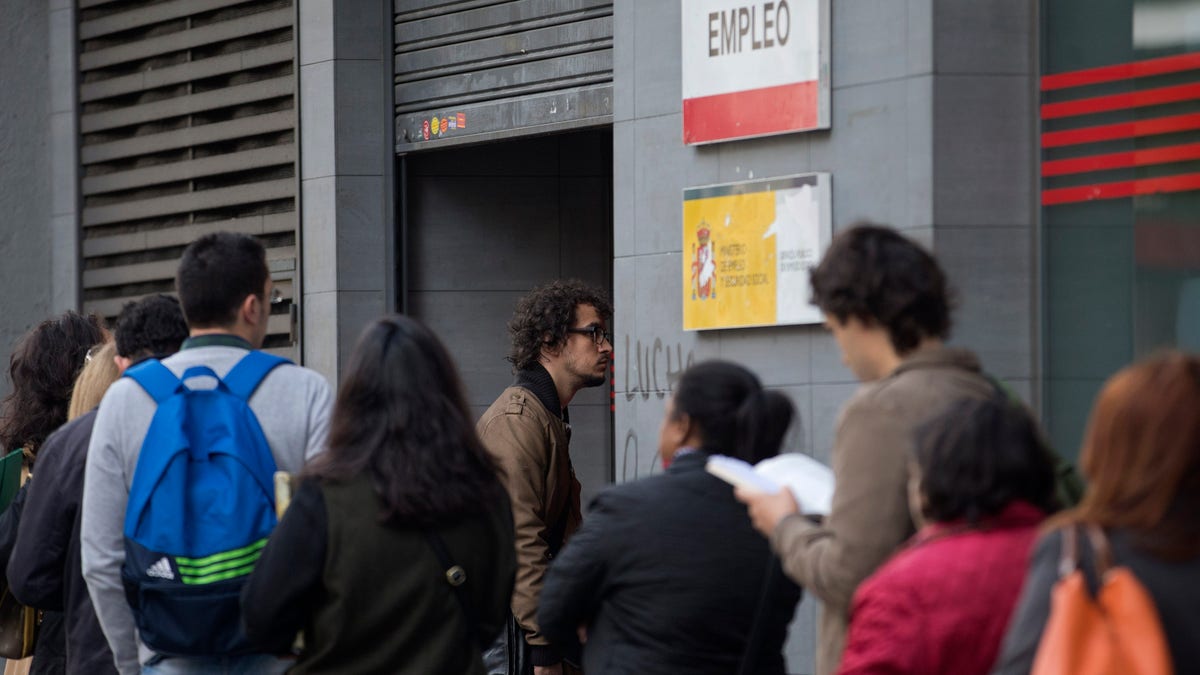
People queue to enter a government unemployment office in Madrid, Spain, Tuesday Oct. 5, 2013. The number of people registered as unemployed in Spain rose by a little over 87,000 in October as many jobs created in the summer tourist season come to an end. The increase comes amid some hopeful signs over Spain's economy with a two-year recession coming to an end in the third quarter, albeit with modest quarterly growth of 0.1 percent. (AP Photo/Paul White) (The Associated Press)
LONDON – A day before the European Central Bank meets to decide whether to cut interest rates, further evidence emerged Wednesday to indicate the economic recovery in Europe is muted.
Eurostat, the EU's statistics office, said Wednesday that retail sales across the 17-country eurozone fell 0.6 percent in September from the month before. The fall offset the previous month's 0.5 percent rise and was just below market expectations for a more modest 0.4 percent decline.
September is the final month of the third quarter, so the drop may alter expectations about how much the eurozone grew during the period.
Markit, the financial information company, also revealed that its composite purchasing managers' index, a broad gauge of economic activity, faltered in October.
While the October PMI reading of 51.9 points was revised up from the initial estimate of 51.5, it was down from September's 27-month high of 52.2. Still, it's above the 50 threshold indicating expansion.
Though the figures continue to point to a second straight quarter of growth for the economy of the 17 European Union countries that use the euro, they suggest the recovery lacks strength and is vulnerable to setbacks. Whether that will be enough for the ECB to cut its main interest rate to a record low of 0.25 percent on Thursday remains unclear.
"The loss of momentum raises concerns that the upturn is faltering and piles further pressure on the European Central Bank to reinvigorate the recovery," said Chris Williamson, chief economist at Markit.
Williamson noted that the economic backdrop has been complicated by the fall in the eurozone's consumer price inflation to a near four-year low of 0.7 percent in October, which has raised concerns about deflation — a prolonged drop in prices — taking hold. The ECB is tasked with setting policy to keep inflation at just below 2 percent.
But with interest rates already at record lows, ECB policymakers will be gathering in Frankfurt knowing they have few traditional monetary policy tools left to shore up the recovery. The ECB has been reluctant to inject cash in the economy to stimulate growth the way the Federal Reserve has done. A rate cut may also not do much good since banks are still too worried about the economy to lend at low costs.
As such, many economists think the ECB will hold off a rate cut and revisit the issue in December, when it will be armed with its staff's latest quarterly economic projections.
Still, the latest figures appear to have dashed any hopes that the recovery from the eurozone's longest-ever recession would gather momentum. With many countries still facing headwinds such as record unemployment and austerity, those hopes now appear overdone.
Next week, Eurostat is expected to show that the eurozone overall grew in the third-quarter something like the 0.3 percent quarterly rate recorded in the April to June period. That second-quarter growth was the first since late 2011, the longest recession to afflict the single currency zone since its creation in 1999.
